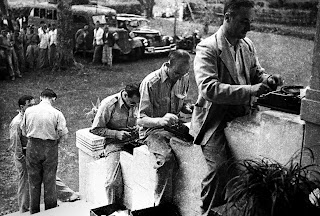Journalists may treat a topic differently. A journalist may choose this angle and sources because he or she thinks it is the most interesting. But another journalist may choose that angle and sources, because of the same reason.

Each journalist has his or her own consideration of choosing angles and sources. Some are objective. They report stories just the way they are. Some other ignore their own intentions and wholeheartedly serve public goodness. While the rest put everything aside but his or her intentions. These last kinds of journalists tend to be subjective.
Subjective point of views will result in subjective products. In this case, subjective stories are derived from journalists’ subjective considerations. Thus, it is understandable that journalism may be subjective or not objective.
Homosexuality can be a good example to elaborate idea of objectivity in journalism. As known, certain religions only recognize men and women. It seems that there is no place for gay. The condition is quite confusing for a journalist with, for example, moderate or permissive point of view. The journalist will criticize religious teaching that restricts homosexuality and undermine the idea of equality. He or she may choose angle and sources that satisfy his or her intentions.
Abortion will also be a good example. Most of religions in Indonesia forbid the practice of abortion. The teachings of the religions state that abortion violates the rights to live. But, some people, including journalists, oppose the idea. They use scientific and medical consideration to strengthen the argumentation.
Indonesian media discuss abortion using religious frame more than homosexuality. But, both leave debates. In my opinion, the main duty of journalists is reporting facts. Nevertheless, they should not ignore moral and ethical values for public good. It means that journalists’ idealism and critical thinking will be the means of censorship. Please note that censorship does not mean hiding truth that people deserve. Censorship means selecting the best information for the sake of truth and public good. Let us say most of religions forbid homosexuality. A free-minded journalist may criticized the teaching. They may quote religious leader who refer to certain religious teaching that elaborates that each person is born in a good condition. It drives an opinion that each person, including gay, is unique and valuable. By using this way of thinking, a journalist announces an idea that is good for everyone. This is the role of journalism in educating public using a peaceful way.
A journalist may agree or disagree with abortion, homosexuality, or other topics. He or she may put his or her personal point of view into the story through the choice of angles and sources. But the journalist should be sure that the idea is good for public and well supported by arguments. That is why I said earlier that it is hard to be objective in writing stories.
(submitted to Reporting on Religion class-Ateneo de Manila University)

No comments:
Post a Comment